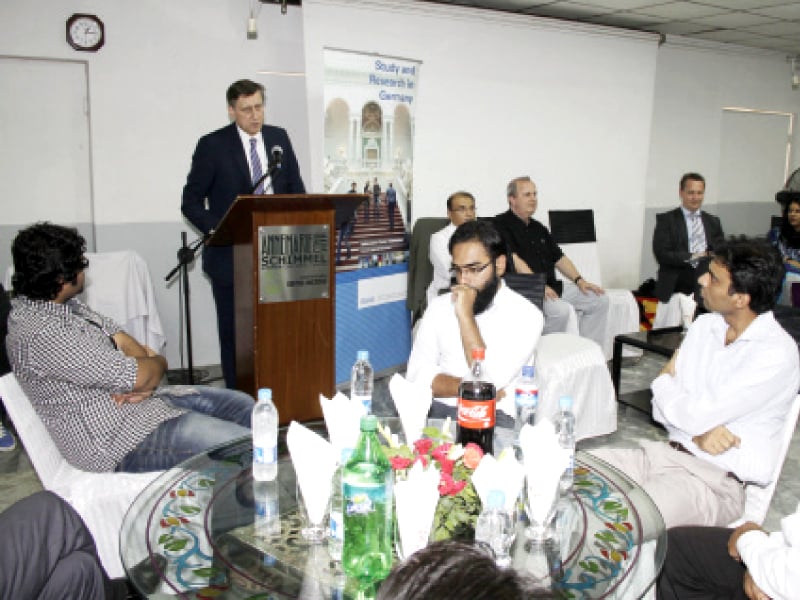
Lack of funding from the government is holding back the Higher Education Commission’s (HEC) programme to send talented Pakistani students for study abroad.
“Times are difficult, but we are trying to get more funds. We are facing problems in getting funds for the batch following you,” HEC Project Director Dr Wasim Hashmi Syed said at a ceremony at Annemarie-Schimmel Haus on Thursday for 35 Pakistani students set to go to Germany in August.
“So make the most of it,” he added. “The HEC had to snatch funds from the government.”
He said while lawmakers claimed to provide three per cent of the education budget to the HEC, the commission received only 0.7 per cent. There had been instances in 2012 when HEC’s funds had temporarily stopped for some students, he said, but hoped that the problem would not recur.
Dr Syed, who looks after foreign faculty hiring programme and foreign scholarships, told The Express Tribune that 300 students had been selected for study abroad, funded by the HEC, in 2013. While these 35 students were going to Germany, others had already started classes at universities in Turkey, Italy, China and Korea.

The students – three women and 22 men are engineering and pure sciences graduates and have been selected for masters leading to PhD degrees by the HEC and the German Academic Exchange Service (DAAD) after a two-year scrutiny of 4,000 applications from across Pakistan.
In her short address, DAAD Director (Pakistan) Ursala Saarbeck highlighted her organisation’s concerns about intermittent funding from the Pakistani government. “We thought it was all over, but the HEC’s efforts helped resume funding,” she said.
German Ambassador Dr Cyril Nunn also addressed the students, the third time in 10 months that he has bid farewell to Pakistani students bound for higher studies in Germany.
He talked about the need to build relationships through academies and cultural exchange and the opportunities and potential challenges students might face.
“The only problem students from across the world face in Germany is that all Germans speak German,” he said. “But that shouldn’t be a problem for Pakistani students because it is certainly easier to learn than Pashto or Punjabi.”
He said Germany was changing constantly and that immigrants and foreign students played an important part in the modification process.
Dr Nunn, who went to universities in Belgium and France, said studying in other countries enabled students to expand their social networks and understand other cultures. He said he was proud to see that academic cooperation was not a one-way street. He had met some German students at the Lahore University of Management Sciences, which he visited earlier on Thursday.
Dr Nunn urged the HEC to recommend more women for study abroad.
Dr Syed, the HEC project director, said many parents had reservations about sending their daughters aboard without a guardian and so there were more male applicants. He said there was no women’s quota.
He expressed confidence in the Pakistani students’ ability to learn German. He said that a few years ago, Pakistani medical students in Cuba had learned Spanish six months ahead of schedule, enabling them to quickly move on to advanced medical courses.
Hafiz Sajjad from Kamoke in Gujranwala district is one of the selected students. He has a bachelor’s in industrial engineering and is aiming to study at the Hamburg University of Technology, Hamburg, or the Technical University in Dortmund.
Armaghan Faisal, a 35-year-old geology graduate and teacher at the Punjab University, says he sees it as an opportunity to change his life and set an example for his two little children.
Aspiring businessman Muhammad Ahad Rafiq, 23, hopes to develop a network for manufacturing and sale of products from and in Pakistan and Germany. Rafiq will be studying in Munich.
The students will receive a 900-Euro monthly stipend for the time of their degree. The embassy gifted them a bag each, made from the German flag and containing literature about life in Germany.
Dr Thomas Ditt, press and culture attaché at the German Embassy; Dr Manuel Negwer, director of the Goethe Institute in Karachi; and Annemarie-Schimmel Haus director (Lahore) Nadia Riaz were also present.
Published in The Express Tribune, May 24th, 2013.
COMMENTS (3)
Comments are moderated and generally will be posted if they are on-topic and not abusive.
For more information, please see our Comments FAQ

















Congratulations to selected scholars & all the best wishes to them for their stay in Germany!
It is good efforts by HEC and DAAD, but some Scholars are facing problem in getting VISA on Manually renewed PASSPORT
Wow Pakistan seems to be turning into a world class destination for pursuing higher studies. German students in Lahore... lol ... those might be the worst students Germany has even seen/